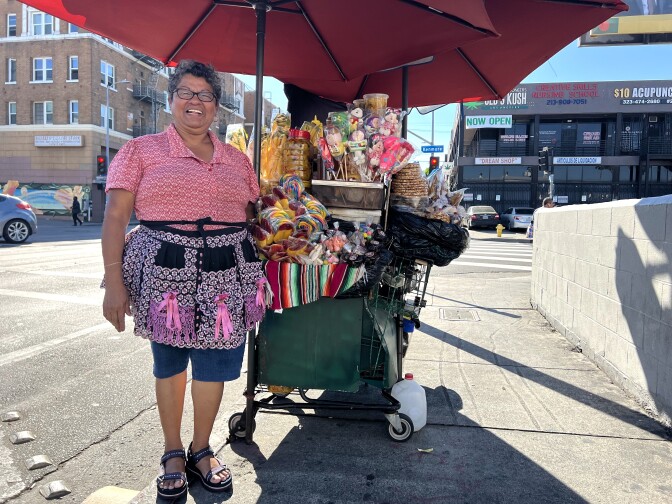You cannot say L.A. and not think about street food in the same sentence.
We don't have to tell you how delicious those street tacos are or how refreshing raspados or frutas are on a hot day.
But here's the thing: our city may allow vendors on the streets but it’s not always been doable for some because California has had some of the strictest street food laws in the country.
That’s going to change in January of 2023.
Gov. Gavin Newsom recently signed SB 972, which streamlines the permit process, and removes barriers to access for vendors across the city.
It’s a game changer.
“We're talking about working class communities that make less than $20,000 and you're expecting them to go through this blueprint cart approval process to sell hotdogs on the street,” Juan Espinoza says, explaining that one vendor he represented had to get blueprints for a cart design to be able to sell his goods.
Espinoza works for Public Counsel’s community development project, which represented food street vendors across California as they pushed for the SB 972 to be signed. Organizers brought business owners, experts and public officials to the table so folks who are from traditionally underrepresented communities could be heard — and advocate for themselves.
Espinoza says it’s a “groundbreaking bill.” Before SB 972, there wasn't any definition in the California retail food code that included street vending. This state was one of the last to legalize it.
There have been stories of vendors having to pick up their things and run from health inspectors or police, or even facing racism and violence from people who don't want them there.
Background On How We Got Here
In 2018, SB 946 made street vending legal for many California vendors. But the retail food code wasn’t set up to support folks selling perishables. Business owners couldn’t get a retail food permit or a health permit.
Food vendors remained essentially illegal and seen as illegitimate.
Part of the problem, according to Espinoza, was that the California retail food code was heavily influenced by the Restaurant Association — not people doing the food vending. The requirements to sell food were onerous, like mandatory multiple sinks. That’s not gonna fit on a fruit cart.

Organizations, including Public Counsel, came together to kickstart the process that would lead to the legalization of their operations. Over eight months a diverse group of vendors — Spanish speakers, Asian and Black vendors — met every single week.
Espinoza points out that vendors know what's in the way of them getting their permits, and when they're included in the discussion, they can come up with very targeted solutions.
In 2021, Public Counsel and UCLA's community development project authored a report. It outlined different barriers and solutions the vendors had identified.
And that was the start of SB 972.
The Impact Of The New Law
These types of changes aren't just benefitting street vendors.
“Someone that has this fancy T-shirt shop that I know on Melrose wanted to put up an ice cream component outside his shop couldn't get that popup approved because of a three compartment sink (requirement),” Espinoza says.
But he says this law is intended to be a lifeline for the people who need it most.
Rosario Melendez has been selling Central American candies, or golosinas as she calls them, in K-town since 1990. Her specialty are mangos with toppings typically only found in El Salvador, where she’s from.
She says she does have a permit, but it doesn't cover everything she sells. The L.A. County Department of Public Health told her she'd need a different setup, and she can't afford it.
When the inspectors show up, sometimes they make her leave, sometimes they don't. Sometimes they just bug her about her umbrella. But she still feels like she has to be on guard.
She relies on her micro-business to survive. The day I met her she said she had made $30. “What can I buy with $30 nowadays,” Rosario asked me.
Within the new law, local counties and offices will be able to figure out how to reduce permitting fees to low costs — possibly even offer incentives to get the paperwork in.
“Regardless of the hurdles that are left, regardless of how difficult it is, there's now a definition in the California retail food code that includes street vendors,” says Espinoza. “That in itself sends a message: if there's a police officer or if there's a health enforcer driving down the street and sees a street vendor, the assumption isn’t [that they are] Illegal or illegitimate. It's in our code. You don't have to run.”
For more about this story, listen to today's How to LA podcast.
About How To LA
We’re here to help curious Angelenos connect with others, discover the new, navigate the confusing, and even drive some change along the way. Host Brian De Los Santos brings you stories about L.A., for L.A., by L.A. — with your help. Like you, we know this city is unique, and that’s why it’s one of the reasons we love it.









